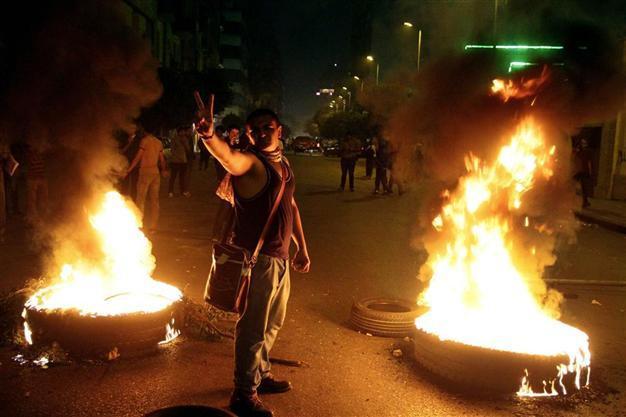Egypt widens crackdown as two top activists ordered arrested
CAIRO - Agence France-Presse

In this Tuesday, Nov. 26, 2013 photo, an Egyptian activist flashes the victory sign during a protest in Talaat Harb Square in Downtown, Cairo, Egypt. AP Photo/El-Shorouk Newspaper
Egypt Nov. 27 ordered the arrest of two prominent activists for defying a new law on demonstrations, as it widened its crackdown on protesters that has so far targeted backers of ousted president Mohamed Morsi.
Tuesday's crackdown on protesters, mainly from secular youth movements, is seen as the opening of a new front by the military-installed authorities which justified the July 3 overthrow of Morsi by saying it was responding to massive demonstrations against his one-year rule.
Morsi's overthrow triggered a massive crackdown against his Islamist supporters which has seen more than 1,000 people killed and thousands arrested.
On Wednesday, Egypt's general prosecutor ordered the arrest of Ahmed Maher, founder of the Apr. 6 movement that spearheaded the 2011 revolt against former president Hosni Mubarak, and Alaa Abdel Fattah, a prominent activist, state news agency MENA said.
The two were to be detained for four days over demonstrations held in Cairo on Tuesday in defiance of the new law that requires organisers to seek prior permission for protests.
"The two are accused of inciting protesters to hold demonstrations that broke the protest law," the prosecution said, according to MENA.
The report added that 24 other protesters who joined Tuesday's demonstration had been ordered detained for four days.
Tuesday's protests were broken up by police using water cannon and tear gas, in the first use in Cairo of the greater powers given to them under the new law.
60 protesters detainedJudiciary and other sources said about 60 protesters were detained, including prominent activist Mona Seif, founder of a campaign against military trials of civilians.
She was held after joining a protest outside the Shura Council, where Egypt's new constitution is being drafted.
The protest was aimed specifically at the inclusion of an article in the draft law that allows the military to try civilians in certain cases.
Seif and a group of 15 other women and 12 men were later released in the middle of the night on a desert road some 10 kilometres south of Cairo.
"The ministry of interior alleges that each one of us had been dropped at her house, which means that all of us are living in the desert," Seif wrote on her Twitter account later.
Maglaa Bedeir, the mother of one of the female protesters, told AFP the women had been badly treated.
"They were beaten before they were put in a truck. The truck then took a long tour meant to scare them before finally dropping them on a desert road," said Bedeir.
Tuesday's other protest, which was organized by Maher, demanded the prosecution of those responsible for the deaths of demonstrators in November 2011 when opponents of the then ruling military junta clashed with police in Cairo.
Analysts criticize new lawAnalysts say the interim authorities were wrong to pass the law, especially since the revised constitution would guarantee freedom of expression.
"By passing such a law the government is creating opponents within its own camp," said Hassan Nafea, political professor at Cairo University.
"It is alienating true young revolutionary groups such as Maher's April 6 movement and others who led the January 2011 revolution." Michele Dunne of the Carnegie Endowment for International Peace said Egyptians were increasingly "objecting to the ascendancy of the military and the re-emergence of the secret police.
"Egyptians won't be patient for long with a state that failed to deliver services, abused human rights, and monopolised economic benefits." Under the law, protesters can be jailed for up to five years if found guilty of offences ranging from covering their faces to carrying weapons at demonstrations.
It also says security forces must first verbally warn protesters at prohibited demonstrations to disperse before using water cannon or tear gas, and should only gradually escalate to the firing of birdshot if other means fail.
On Tuesday night, 10 members of the 50-member constitution panel that is drafting the new basic law suspended their work to protest the arrests of the demonstrators.
